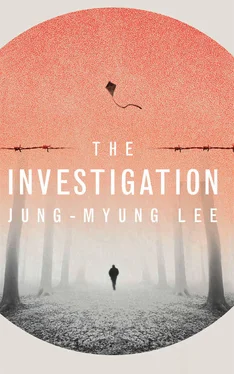Take all myself.
‘A rose by any other name still smells the same,’ Sugiyama continued stiffly. ‘A name means nothing. What’s important is your essence. Whether you’re Yun Dong-ju or Hiranuma Tochu, you’re a cheeky, stubborn Korean.’
‘A name is the symbol of one’s very being,’ Hiranuma protested in a low voice. ‘It represents not only someone’s face and body, but also his memories, dreams, past, present and future. Just as a single word can contain various feelings, one sentence can espouse a variety of meanings.’
One sentence can espouse a variety of meanings? Then it surely meant that the arsehole had used Shakespeare’s words to convey multiple thoughts. A rose by any other name was still fragrant, but it was no longer a rose if it wasn’t called a rose. Even the most fragrant rose will lose its scent and fade as time passes, but its name will live on, and the utterance of the word ‘rose’ will recall its beauty and scent. The rose may disappear, but the name never would.
Hiranuma pushed on, ignoring Sugiyama’s mounting confusion. ‘Juliet’s soliloquy is a paradoxical expression of the fact that a presence is defined by a name.’
‘Paradoxical?’
Hiranuma explained that it was a way to emphasize how something was said by not saying it, and to assert that it was true by saying that it wasn’t. Something clanged in Sugiyama’s head. A sentence could be interpreted the opposite way, depending on who read it? Then was Juliet’s request to discard the name really a clarification of the fact that names defined everything? Romeo and Juliet despaired because of their families, because of who they were. Their love became a tragedy. If they cast away their names, nothing would have stopped the consummation of their love. But in the end they couldn’t discard them; their names defined their existence, and that made their love ever more star-crossed.
‘My name is Yun Dong-ju,’ Hiranuma said, his voice steely and dignified.
Sugiyama glared at him. ‘That’s not your name. Don’t you know that Korean is banned?’
‘Without the name Yun Dong-ju, I’m nothing. Hiranuma is a mask that the Japanese force me to wear.’
His words were pedantic and ridiculous. Or were they? Working in his small cell, this degenerate had slipped books into postcards to seduce and brainwash Sugiyama.
Sugiyama swatted his sweat-soaked hat on his thigh. ‘Shut up! Nothing’s changed.’
‘No, you’ve changed.’
Hiranuma was right. If he hadn’t read Romeo and Juliet he wouldn’t be engaged in a silly argument about roses and names. He had to keep his guard up. Sugiyama balled his fists, but they trembled as it dawned on him that he couldn’t return to who he’d been before. He was afraid of what he’d become; a person who could be transformed by a book.
As the summer wore on, Sugiyama wandered the maze of neatly lined bookcases every night. His censorship duties had exploded, but he wasn’t resentful; he found himself looking forward to the postcards. Then, one day, he put down his red pen for good. He wasn’t reading the postcards to censor them any longer. Instead he was heartened by the neat handwriting, warm exclamations, delicate adjectives and familiar nouns. He followed the trail of codes hidden in the postcards. He read his way through Dostoyevsky, Valéry, Baudelaire, Gide, Homer, Dante, Shakespeare and Cervantes. He was changing, willingly. He became addicted to the printed word. He grew anxious if he didn’t read something — anything. Had he been brainwashed? He couldn’t do anything about it, if it were so.
The rainy season arrived at the prison and falling water undulated like a sheet being drawn through the air; everything beyond it was hazy, undefined, unmoored. By the time the rain stopped, one season would have passed and another would be dawning. Sugiyama knew that the August sun would cool and the September wind would begin to blow. He stayed up late one night, looking at the long shadow cast by the tall watchtower in the yard. He’d read a postcard the previous night with a poem written on it — ‘Day in Autumn’ by Rainer Maria Rilke — and he couldn’t stop thinking about it.
DAY IN AUTUMN
After the summer’s yield, Lord, it is time
to let your shadow lengthen on the sundials
and in the pastures let the rough winds fly.
As for the final fruits, coax them to roundness.
Direct on them two days of warmer light
to hale them golden towards their term, and harry
the last few drops of sweetness through the wine.
Whoever’s homeless now, will build no shelter;
who lives alone will live indefinitely so,
waking up to read a little, draft long letters,
and, along the city’s avenues,
fitfully wander, when the wild leaves loosen.
Dong-ju had sent him an autumn greeting hidden in a romantic, introspective prayer.
FROM WHERE DOES THE WIND COME AND WHERE DOES IT GO?
Sugiyama walked into the new season, his eyes squinting. Autumn smelled of sunlight and pungent fallen leaves. The small, square sky above the prison looked like a piece of blue cloth, framed by solid walls sprouting sharp thorns. Caught in the barbed wire, the afternoon sunlight flashed like the scales of a fish in a net. Prisoners continued to arrive; many others left, some limping, others covered by a straw mat. The eyes of the surviving prisoners turned chilly, reflecting the season.
Sugiyama walked up to Hiranuma, who was leaning against a poplar tree. ‘What is it about poems that brought an intellectual like you to prison?’
Hiranuma stared up at the sky without answering. After a long time he said, ‘Poetry is a temple of words.’
A temple? That made no sense. A temple was for pure and holy souls, where sinners asked for forgiveness, the downtrodden were consoled and people prayed for eternal life. So poetry consoled the soul and allowed you to dream of eternity? It sounded romantic. Who believes in romance these days? Sugiyama hawked and spat out his disdain.
‘Poetry is reflective of your soul,’ Hiranuma went on quietly. ‘It is casting a bucket into a dark well and drawing up the truth. We’re reassured by poetry. We learn from it, and ultimately it saves us.’
‘A temple is there to help people who are beaten down by life. How can a stupid poem do that?’ Sugiyama raised his voice. ‘You’re the only one who can help yourself. A cruddy poem that conceals its true purpose behind shiny words can’t do that. I’m just on this side of literacy, but I won’t be fooled by the crazy talk you people spout.’
‘You may have only recently become literate, but you’re already a skilled writer. You understand metaphor and symbolism. You appreciate the significance of language. Even your curses are poetic, you know. Even when you insult someone, you freely employ symbolism and metaphor.’
‘Symbolism and metaphors? You’re making shit-waves! A lie’s still a lie even when you use crafty wordplay. It’s the same crap as waging war for peace, and parting ways because you love each other.’ Sugiyama huffed like an enraged bull.
Hiranuma smiled faintly, fatigued. ‘See, you just did what I was talking about. Making shit-waves. You used a metaphor to describe useless words. You blew life into that sentence. You helped me see an ordinary concept in a completely different way.’
‘That’s ridiculous. Cursing can’t be poetic!’
‘Sure it can. Your curses are rooted in truth. Sometimes illogical lies can become the truth. So that’s when it would make sense to say a beautiful war or a sweet farewell.’
‘A beautiful war? Someone like you doesn’t know anything about war! You can’t even imagine how a man gets destroyed on the battlefield, how he dies. Have you ever slept in a bloody puddle, covered by flies? Have you ever been caught by the enemy and, not knowing whether you were dreaming or awake, told them where your fellow soldiers were hiding? That’s war. Filthy.’ His voice broke and dropped. Sugiyama had always known he was damaged. But perhaps things could be different. Maybe he still had a soul somewhere, small and desiccated.
Читать дальше












